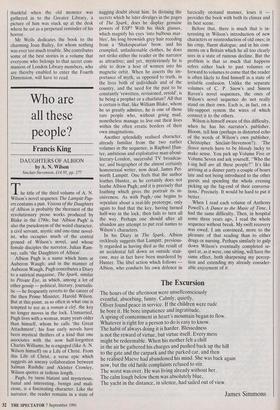Who are all these people?
Francis King
DAUGHTERS OF ALBION by A. N. Wilson
Sinclair-Stevenson, £14.95, pp. 277
The title of the third volume of A. N. Wilson's novel sequence The Lampitt Pap- ers contains a pun. Visions of the Daughters of Albion is probably the thorniest of the revolutionary prose works produced by Blake in the 1790s; but 'Albion Pugh' is also the pseudonym of the weird character, a civil servant, mystic and one-time novel- ist, who occupies much of the central ground of Wilson's novel, and whose female disciples the narrator, Julian Ram- say, calls 'the Daughters of Albion'.
Albion Pugh is a name which hints at Auberon Waugh; and in the manner of Auberon Waugh, Pugh contributes a Diary to a satirical magazine, The Spark, similar to Private Eye, in which, among a lot of other gossip — political, literary, journalis- tic — he frequently reverts to the career of the then Prime Minister, Harold Wilson. But at this point, as so often in what one is tempted to see as a roman a clef, the key no longer moves in the lock. Unmarried, Pugh lives with a woman, many years older than himself, whom he calls 'the Great Attachment'; his four early novels have been mystical thrillers of a kind that one associates with the now half-forgotten Charles Williams; he is engaged (like A. N. Wilson himself) on a Life of Christ. From this Life of Christ, a verse epic which suggests an uneasy collaboration between Salman Rushdie and Aleister Crowley, Wilson quotes at tedious length.
Pugh, by turns blatant and mysterious, banal and interesting, benign and mali- cious, is a fascinating character. Like the narrator, the reader remains in a state of
nagging doubt about him. In divining the secrets which he later divulges in the pages of The Spark, does he display genuine powers of ESP? With his thick glasses, which magnify his eyes 'into bulbous mar- bles', his long brownish grey hair receding from a 'Shakespearian' brow, and his crumpled, unfashionable clothes, he does not strike either the reader or the narrator as attractive; and yet, mysteriously he is able to draw a host of women into his magnetic orbit. When he asserts the im- portance of myth, as opposed to truth, in the lives both of individuals and of the country, and the need for the past to be constantly 'rewritten, revisioned, retold', is he being a prophet or a charlatan? All that is certain is that, like William Blake, whom he so greatly admires, he is one of those rare people who, without going mad, nonetheless manage to live out their lives within the often erratic borders of their own imaginations.
Another splendidly realised character, already familiar from the two earlier volumes in the sequence, is -Raphael Hun- ter, ambitious and exploitative man-about- literary-London, successful TV broadcas- ter, and biographer of the almost certainly homosexual writer, now dead, James Pet- worth Lampitt. One feels that the author loathes Hunter, as he certainly does not loathe Albion Pugh; and it is precisely that loathing which gives the portrait its in- cisiveness. As with Pugh,- one begins to sepculate about a real-life prototype, only again to find that the key, having turned half-way in the lock, then fails to turn all the way. Perhaps one should after all abandon any attempt to put real names to Wilson's characters.
In his Diary in The Spark, Albion recklessly suggests that Lampitt, previous- ly regarded as having died as the result of an accidental fall down an outside stair- case, may in fact have been murdered by Hunter. The libel action which follows — Albion, who conducts his own defence in farcically orotund manner, loses it — provides the book with both its climax and its best scene.
Before that, there is much that is in- teresting in Wilson's introduction of new characters or reintroduction of old ones; in his crisp, fluent dialogue; and in his com- ments on a Britain which he all too clearly sees in a state of ruinous decline. But the problem is that so much that happens refers either back to past volumes or forward to volumes to come that the reader is often likely to find himself in a state of irritable confusion. Unlike the separate volumes of C. P. Snow's and Simon Raven's novel sequences, the ones of Wilson's novel sequence do not really stand on their own. Each is, in fact, on a life-support system the wires of which connect it to the others.
Wilson is himself aware of this difficulty, when he has his narrator's publisher, Bloom, tell him (perhaps in distorted echo of the words of Wilson's own publisher, Christopher Sinclair-Stevenson?): 'The fleuve novels have to be bloody lucky to make sense. You pick up Volume Five or Volume Seven and ask yourself, "Who the f–ing hell are all these people?" It's like arriving at a dinner party a couple of hours late and not being introduced to the other guests and spending the whole evening picking up the fag-end of their conversa- tions.' Precisely. It would be hard to put it better.
When I read each volume of Anthony Powell's A Dance to the Music of Time, I had the same difficulty. Then, in hospital some three years ago, I read the whole sequence without break. My swift recovery was owed, I am convinced, more to the pleasure of that reading than to either drugs or nursing. Perhaps similarly to gulp down Wilson's eventually completed se- quel at, as it were, one sitting, will have the same effect, both sharpening my percep- tion and extending my already consider- able enjoyment of it.


















































 Previous page
Previous page